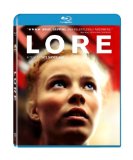| Reviews & Columns |
|
Reviews DVD TV on DVD Blu-ray 4K UHD International DVDs In Theaters Reviews by Studio Video Games Features Collector Series DVDs Easter Egg Database Interviews DVD Talk Radio Feature Articles Columns Anime Talk DVD Savant Horror DVDs The M.O.D. Squad Art House HD Talk Silent DVD
|
DVD Talk Forum |
|
|
| Resources |
|
DVD Price Search Customer Service #'s RCE Info Links |
|
Columns
|
|
|
Lore
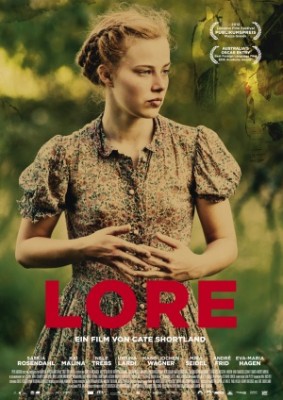
Please Note: The images used here are stills provided by Music Box Films and are not taken from the current Blu-ray edition under review.
It's always troubling to ponder, the way that the time, place, and culture in which one is born and raised can so easily slot you onto the wrong side of history. How sure can any of us be that we would've been in the tiny minority of Southern Abolitionists in the Civil War era, or one of only 3% of the French who actually participated in the Resistance to the Nazis? Or, even more overpowering, if we had been brought up as "good Germans" in Hitler's Germany itself? It's this latter situation that the Australian filmmaker Cate Shortland (working from Rachel Seiffert's novel The Dark Room) explores in her lyrical, fascinating second feature, Lore, which takes place in the aftermath of the Allies' victory (and Hitler's suicide) and centers around a teenage girl whose parents, formerly dedicated and now implicated and shamed Nazis, are imprisoned, leaving her and her siblings to fend for themselves, homeless in a disgraced nation overrun with Russian, British, and American occupiers who, having themselves suffered in battle with Germany and having witnessed the evidence of Holocaust atrocities, have little time or empathy for the plight of the enemy's families. This is thematic territory both extremely fertile and very risky: How does one depict the hardships of Germans after WWII, and the very ambivalent and slow awakening from systematic cultural malice, in a way that respects and conveys the painful personal dimension without trivializing or apologizing for Nazi evil and "ordinary" Germans' complicity? The answer -- as Roberto Rossellini (Germany Year Zero), Volker Schlöndorff (The Tin Drum), and Michael Haneke (the Nazi-origin investigation The White Ribbon), et. al, can attest -- is to focus on the German children, hapless, molded, and proudly obedient followers but not instigators of the horrors. Shortland and Seiffert have certainly learned by that example, story-wise, but Shortland's cinematic method is something else again; it's the biggest risk of all to make a beautiful film that tells this harrowing moral minefield of a story, but Shortland's visual, performative, and dramatic approach creates a beauty that doesn't slight the story's moral complexities, but rather crystallizes and deepens them.
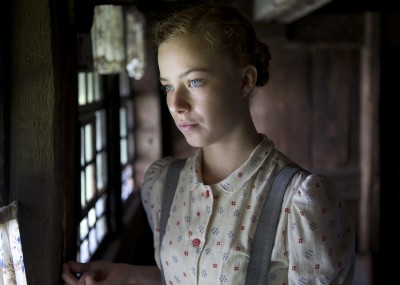
Lore (the entrancing Saskia Rosendahl) and her brood of younger siblings, heretofore accustomed to the idyllic life of the higher-up Nazi class, are set out on their journey alone across a dangerously chaotic immediately-postwar Germany by their embittered, despondent mother (Ursina Lardi), who, along with their Nazi-general father (Hans-Jochen Wagner), must turn herself in to the Americans and face imprisonment for their participation in war crimes. Not only must these children beg and bargain for shelter and food; they also have to face a national mood of defeat, shame, confusion, and recrimination written on every farmer's and pensioner's face, so thick it's palpable -- and all this added to the dangers of being suspect, reviled Nazi progeny without the proper papers to get them to the far-away safe haven of their grandmother's house, which lies on the other side of the Russian and American zones. Their savior comes in the paradoxical form of Thomas (Kai Malina), a Jewish boy not much older than Lore who's been liberated from the death camps and has the proper ID to show American troops; posing as their brother, he can get Lore and her brothers and sisters where they need to go. The younger children are just grateful for the food and security, but Thomas's presence throws the more indoctrinated and wounded Lore into a tailspin that finds her alternately castigating and shunning Thomas with the shameless, reflexive anti-Semitism with which she's been raised; clinging to him desperately as the protector of her vulnerable charges; and, to her confusion and dismay, returning his glances of erotic appreciation and longing (somewhere in this cruel jumble of history, culture, and ethnicity, biology exists, too, and these two are a teenage boy and a teenage girl, whatever else they might be). What Lore eventually discovers, about Thomas and herself, through his catalyzing presence stirs something in her, some capacity we've already seen glimpses of, that we can reasonably hope is an ember of conscience and insight vis-Ã -vis the realities of her homeland and the "values" of her childhood.
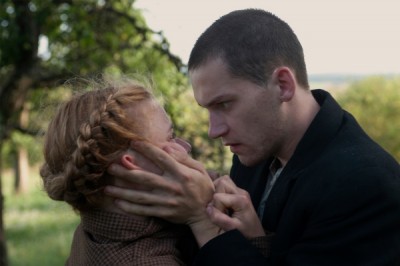
If any of that implies overly pat closure or realization, I can assure you -- while avoiding indulgence in too many spoiler-details -- that Seiffert's story allows for a healthy and consistent degree of ambiguity, uncertainty, and subtlety right up to the very end. Much more importantly in terms of the film, Shortland's intimate cinematic language and idiosyncratic emphases evoke, visually and aurally (the film's deep, densely-textured and darkly melodic score by Max Richter, who contributed similarly rich and melancholic melodies to Ari Folman's Waltz with Bashir and Scorsese's Shutter Island, is for the most part very apt and effective), the experience of Lore, her siblings, and Thomas, in all its weak/vulnerable humanity and moral grayness, in a way that doesn't reduce them to martyrs, heroes, victims, or monsters, despite tragedies they've suffered or wrongs they're complicit in (and make no mistake, the journey is tough, eye-opening, survivalist enough that nobody's hands are left entirely clean). With only a few misguided exceptions -- scattered, rare "action" or dramatic-peak moments built conventionally through slo-mo and music, much less effective than the bulk of the film -- Shortland's visual style, an observant, handheld approach that tends to defamiliarize by going in too close on the jolting detail, going back too wide, racking unexpectedly in mostly shallow-focus compositions, and otherwise framing and composing in unpredictable, spontaneous-feeling ways, doesn't succumb to the distracting, artificial jitteriness of so many arbitrarily "raw" handheld-shot films, instead evoking the immediacy of Lore's experience through a continual, lilting, rocking buoyancy of the almost never-still frame (all gorgeously well-facilitated by cinematographer Adam Arkapaw's way of capturing light and color within the haunting compositions, and most of all by the director's choice to shoot on Super-16mm then blown up to 35mm, a cinematographic process that, as it has in such visually memorable works as Derek Cianfrance's Blue Valentine, Ira Sach's Keep the Lights On, Jan Troell's Everlasting Moments, and Miguel Gomes's Our Beloved Month of August, affords every frame additional texture, depth, and a lovely, immediate, delicate tangibility). In that context, the litle actions, unspoken moments, and details that Shortland chooses -- the Hitchcockian tableau of Lore's peephole-spying eye taking in, through her parents' ugly private relations, the meaning of Nazi private life; the gruesomely oozing paste, used to post up newspaper pictures of death-camp horrors, which comes off in ropy, pitch-like, indelible strands on Lore's fingers as she tries to touch the mortifying revelations of what her way of life has really meant; the little coy-eyed porcelain deer figurine that, over the course of the film, becomes a carefully positioned but unmistakable signifier of the creepy hollowness of falsely-innocuous, "healthy" Nazi utopia -- make for a silver-screen vision that manages to be breathtakingly beautiful without, for the most part, evading Lore's, Thomas's, and Germany's irreducible, awful conundrum.
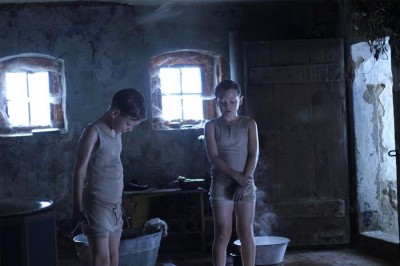
Like her generational and aesthetic peer Andrea Arnold (Fish Tank), Shortland is, in some respects, a kindred spirit to her fellow antipodean Jane Campion (The Piano, The Portrait of a Lady, and no coincidence that Campion herself recruited Adam Arkapaw, Lore's D.P., for her latest project, the miniseries Top of the Lake): Both filmmakers have a roving sensualist's eye for natural beauty and the odd, telling detail. As visually enthralling as this makes Lore, though, I had my reservations, as might anyone contemplating the idea of a story about WWII's aftermath in Nazi Germany as seen through such an eye; might not that approach render a scenario burdened with such a heavy historical and moral context too subjective, too ornate, too fanciful -- ineffectual or evasive at best, at worst oblivious and inadvertently offensive? I'm pleased to report that my fears were vanquished almost without exception (the film's stumbles are infrequent, coming more in the form of spell-breaking tonal blunders than trivialization, and it recovers from them quickly). Shortland is fully cognizant of what's at stake, and the successfully uses her manner of creating alluring, visceral imagery as a way to enhance, not sap, the film's seriously galvanizing and paradoxical aspects, drawing us in and making Lore's overwhelming, contradictory, shellshocked and searching emotional reality our own. Lore is a history-haunted movie that haunts us in turn, tackling a difficult, sticky story with all due gravity and much grace -- a fine, intriguing effort from a filmmaker whose future visions hold the promise of great things.
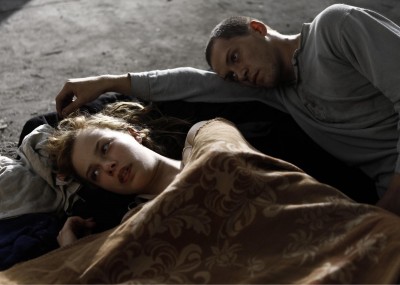
Video:
This Blu-ray transfer of Lore -- AVC/MPEG4, 1080/24p -- is gorgeous, perfectly preserving every vivid, beautifully textured nuance of cinematographer Adam Arkapaw's Super-16 photography (blown up to 35mm -- a scenario which makes it vital that too much digital tweaking/noise reduction not interfere with the special, intentional texture/grain that results from that process, which I'm happy to report has been very conscientiously respected). The colors are lush and vivid, all darks solid, and skin tones natural-looking, with no aliasing or edge enhancement/haloing noted. This is one of the more miraculously cinematic, truly film-like presentations I've seen on digital home media.
Sound:This is the kind of film, only rarely and momentarily "slick," that nevertheless has the kind of soundtrack where a barking dog rushing toward us and then disappearing from the screen to our left continues barking in the "distance" on the left rear speaker, and that wide-ranging, sophisticated, but never overdone or gimmicky soundtrack is rendered with perfect clarity. All dialogue, ambient sounds, sound effects, and Max Richter's deep, rich score are presented in all their resonance, sonorousness, and robustness, encompass all highs and lows and mids and without any distortion or imbalance of any kind, on the DTS-HD Master Audio 5.1 surround soundtrack (in German with optional English subtitles) provided here.
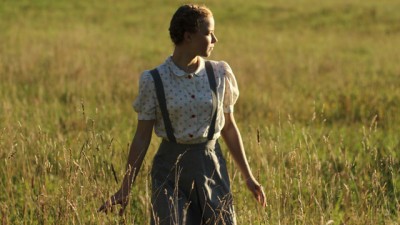
--About six minutes' worth of deleted scenes, some clearly (wisely) omitted because they contain too much exposition for the film's final, more impressionistic and subtle form, as well as some additional, unused selections from the many landscape cut-in shots that set much of the film's tone.
--An alternate ending, beautifully shot but, as a title card informs us, rejected (rightly, in this reviewer's opinion) as too lyrical and "romantic."
--"Memories of a German Girl," (10 min.), a voice-over recorded in March of 2013 by a woman, Angela Greiner, who was 10 years old in Germany at the time of the war. Over photo-mementoes of her own history and footage from the film, Greiner relates her experience as a German in the World War II era to that depicted in the film, providing some invaluable historical/interpretive context for the film along the way.
--A post-screening panel discussion/Q&A from February of 2012, in which the director of L.A.'s Goethe-Institut (a German-culture/language center) and a contributing editor for the Jewish Journal of Greater Los Angeles share their perspectives on the film and field audience questions.
--The film's theatrical trailer.
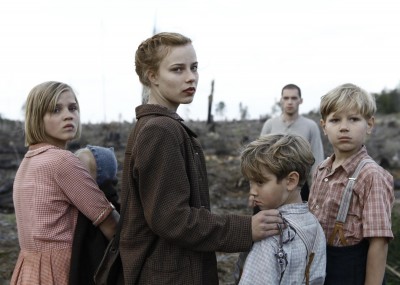
History may, as they say, be written by the winners, but Lore takes us deep into that cinematic gray zone, typified by Rossellini's Germany Year Zero, that asks us to consider the losing side, however morally important their loss might have been. In this case, that means following along with 14-year-old Lore and her younger brothers and sisters, the unreconstructed children of Nazis, as they wander through the decimated post-WWII Germany, at the same time that Lore, just old enough to have some political and cultural awareness, is utterly lost morally and emotionally as the vileness of the values propagated by her charismatic Fuhrer and her dedicated-Nazi parents is laid shockingly, humiliatingly bare. This is risky thematic/narrative territory, and director Cate Shortland takes further risks by filming Lore's journey -- in which her world is further shaken by the presence of a slightly older Jewish boy whom she reflexively regards as a racial inferior even as she becomes both dependent upon and attracted to him -- in an impressionistic, eccentric, and lyrical style, an approach that wouldn't seem the first choice for conveying the hard truths contained in the tale of a girl from a "good" Nazi family who must face down the fact of the Holocaust that her beloved, upstanding, "healthy" Germany inflicted. The obvious fear would be some sort of beautification or rewrite of a history that must never be glossed over or trivialized, but Shortland's skill at spinning a story through captivating, idiosyncratic imagery and odd, striking emphases is matched by her real sense of the gravity and meaning of the time, place, and people being depicted; it is a strange, ambiguous physical and emotional journey Lore takes from "home," with its complacent and natural jingoist pride, to some glimmer of conscience, and Shortland's strange, ambiguous visuals are a surprisingly good match, their beauty enrapturing, but never at the too-high cost of merely aestheticizing a grim historical episode. Lore is a film that, despite some momentary flaws, is very good in a very unusual way: It's as sensually, tangibly beautiful to look at as it is historically, emotionally, and morally dignified and astute, a work whose inner and outer beauty seem, improbably but genuinely, one and the same. Highly Recommended.
|
| Popular Reviews |
| Sponsored Links |
|
|
| Sponsored Links |
|
|
| Release List | Reviews | Shop | Newsletter | Forum | DVD Giveaways | Blu-Ray | Advertise |
|
Copyright 2024 DVDTalk.com All Rights Reserved. Legal Info, Privacy Policy, Terms of Use,
Manage Preferences,
Your Privacy Choices | |||||||









